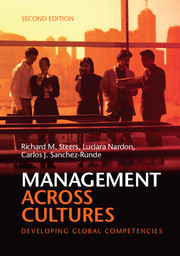Book contents
- Frontmatter
- Contents
- List of exhibits
- Guided Tour
- Introduction
- Part I Challenges for Global Managers
- Part II Developing Global Understanding
- Part III Developing Global Management Skills
- 6 Communicating across cultures
- 7 Negotiating global agreements
- 8 Leading global organizations
- 9 Managing a global workforce
- 10 Working with global teams
- 11 Living and working globally
- 12 Epilogue: the journey continues
- Appendix Models of national cultures
- Name and company index
- Subject index
- References
12 - Epilogue: the journey continues
from Part III - Developing Global Management Skills
- Frontmatter
- Contents
- List of exhibits
- Guided Tour
- Introduction
- Part I Challenges for Global Managers
- Part II Developing Global Understanding
- Part III Developing Global Management Skills
- 6 Communicating across cultures
- 7 Negotiating global agreements
- 8 Leading global organizations
- 9 Managing a global workforce
- 10 Working with global teams
- 11 Living and working globally
- 12 Epilogue: the journey continues
- Appendix Models of national cultures
- Name and company index
- Subject index
- References
Summary
Management challenge
We have now come full circle in this book. We have argued that in today’s economy all managers are global managers, and that they all face similar challenges regardless of where or how they work. We have discussed three types of managerial assignments – expatriates, frequent flyers, and virtual managers – and looked at both the similarities and differences in these assignments. We have examined three major aspects of the work environment – cultures, organizations, and situations – that can affect managerial success or failure. On the basis of this, we have explored six specific mechanisms for developing global management skills. The challenge for managers, then, is to integrate these factors into a unified approach to global management. This is a difficult, but nonetheless necessary, task for future success. We close with a summary of our discoveries, as well as several reflective thoughts on the future of management and what managers might consider as they go forward into uncharted waters.
Chapter outline
What have we learned? page 406
Where do we go from here? 411
Your time is limited; so don’t waste it living someone else’s life. Don’t be trapped by dogma – which is living with the results of other people’s thinking. Don’t let the noise of others’ opinions drown out your own inner voice. And most important, have the courage to follow your heart and intuition. They somehow already know what you truly want to become. Everything else is secondary.
Steven Jobs Former chairman, Apple Computers, United StatesThe most dangerous thing is to be successful. You then think every decision is the right one.
Wong Wai Ming Chief financial officer, Lenovo, China- Type
- Chapter
- Information
- Management across CulturesDeveloping Global Competencies, pp. 405 - 416Publisher: Cambridge University PressPrint publication year: 2013



